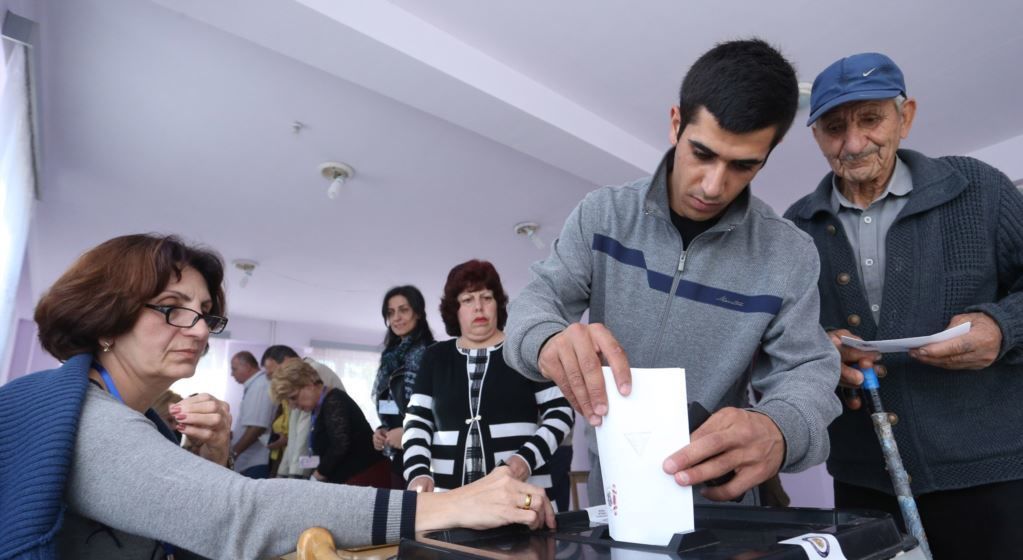Thu Mar 16 2017 · 8 min read
From Presidential to Parliamentary Governance

By Yevgenya Jenny Paturyan

Following the parliamentary election on April 2, the Republic of Armenia is set to transition from a presidential to a parliamentary system of governance. There has been much public discourse about the differences and implications of each system for the development of democracy since the 2015 Constitutional referendum which triggered this change. Will this new parliamentary system of governance have the potential to create the conditions for a stronger democracy?
Before moving on to a comparative analysis, it is important to dispel one of the most absurd arguments against the vote for a parliamentary system of government - that is Armenia will become (even) less democratic because people will not be directly electing the country’s leader anymore. Germany is not less democratic than the U.S. because Germans do not directly elect the Chancellor. Similarly, Norway is not less democratic than France because of the difference in their governance structures. The two systems of electing top country leadership are different. They have their pros and cons. There are good arguments one could voice in defense of the presidential system, but “less democracy” is a weak argument.
In a presidential system, voters elect the top leader of the executive branch of the government: the president. In a separate election, they choose their representatives to the legislative branch: the Congress, Parliament, or National Assembly. Both branches are equally matched, because they both have been directly empowered by the people. This is the idea of the separation of powers and checks and balances. They are supposed to be working together for the benefit of the people, but they are also supposed to be keeping an eye on each other.
In the parliamentary system, voters elect the parliament. Once elected, the parliament forms the cabinet (the top leadership unit of the executive branch) headed by the prime minister. The cabinet and the prime minister are responsible to the parliament and can relatively easily be removed by the parliament. On the other hand, since the prime minister and the cabinet were appointed by the parliament in the first place, they are likely to enjoy the support of the parliamentary majority unless they mess up badly. In contrast to the principle of the “separation of power,” political scientists often describe this system as a “fusion of power.” Does this mean that power goes unchecked? No. The political opposition has an important role to play in the parliament, and sometimes in the executive branch of the government (if it becomes a coalition member).
The two systems are similar in that respect: the real check on political power always comes from the (a) political opposition, (b) critical and independent mass media, and (c) active citizens. Presidential systems can be abused as badly as parliamentary ones if power goes unchecked. In fact, the historical record so far seems to favor parliamentary democracies as more stable. They have higher rates of surviving, while presidential democracies are more vulnerable to creeping or abrupt authoritarian takeover. Most democracies today are parliamentary.
Presidential systems can be abused as badly as parliamentary ones if power goes unchecked. In fact, the historical record so far seems to favor parliamentary democracies as more stable.
If parliamentary systems seem to be more likely to attain and retain democracy, does that mean they are better? Not necessarily, because there is no abstract “better” or “worse.” There are advantages and disadvantages, AND there is an extremely important question of the local context. Instead of asking “which one is a better system?” the question that should be posed is “how to make the system deliver things we want to see in Armenia?”
The list of differences between the presidential and the parliamentary systems is long; the focus here will be on those which are particularly relevant for the Armenian context.
Speed and flexibility of decision-making: In general, properly functioning parliamentary systems are faster and more flexible because the legislature and the executive are “in sync” and do not need to worry about overcoming each other’s checks-and-balances. A persistent myth is that Armenia needs a strong president because of the security threats and a potential need to act decisively. That’s just what it is - a myth. And a dangerous one. Of course, with the current semi-authoritarian superpresidentialism you get that kind of uninhibited decision-making at the top, but you could have that in a democratic parliamentary system as well.
Stability of the government: The biggest concern of political scientists is that parliamentary governments can be notoriously unstable. If no single political party gains a majority in the parliament, a coalition government needs to be formed. A coalition government holds only as long as the coalition members agree on a common course of action. Such alliances can be tense and short-lived. Italy is a prime example. Incidentally, the Italian experts were contemplating the introduction of the second round of voting if no stable majority emerges in the first round of elections. While Italians were pondering the idea, Armenia incorporated this provision into its new Constitution. Some might have argued that we were far ahead of some European countries by adopting this course. However, the Italian people rejected that idea in the December 2016 referendum…
Regarding the stability of the government, in Armenia, the concern is not the inability to form stable and lasting coalitions, it is the opposite fear of having a government that is too stable. That is, the same folks in power for the next few decades to come. In political science, this is referred to as the “dominant party system.” One party is so powerful that it maintains the majority in the parliament (hence, forms the cabinet) year after year, election after election. Japan and Mexico are some of the examples. Is this likely to happen in Armenia? At the risk of making predictions in an unpredictable country, it is very likely to happen. Is it inevitable? Nothing is inevitable. Saakashvili was sure he would be Georgia’s next prime minister. Where is he now?
Elections deliver surprise victories, but victories do not fall from the sky. It is up to the opposition to prove its mettle (even if the playing field is tilted) and it is up to the voters themselves. There is no excuse for not voting according to one’s conscience. If a voter believes the current government is able to steer the country well, they should vote for them, if not, then vote for someone from the opposition. The important thing is not to sell one’s vote, not to give in to bullying or fear.
Accountability: Who is in charge is a tricky point when comparing the two systems. Parliamentary systems with many parties can be confusing for the voter. It might feel like too many voices shouting simultaneously. In comparison, the presidential system with a clear leader is simpler. But there is a catch. In the parliamentary system, the parliamentary majority (or the coalition) is in charge. They are the ones to praise or blame for whatever policies get implemented. Now compare that with the (properly functioning) presidential system with equally matched executive and legislative powers. The president proposes the policy; the congress modifies it; few years of implementation show that it is a bad policy. Whose fault is it? The president can say that the modifications weakened it; the congress can say that it was a bad policy from the start. You might think that the question of “who leads the country” is easier to answer for the presidential systems: the president leads the country. More often than not, it’s a wrong answer. When one looks at the real decision-making behind the scenes, it is easier to pinpoint (and hold accountable) the decision-makers in the parliamentary system.
Compromise is needed in both systems at least to some degree. But the presidential system is based on the winner-take-all idea, which does not sit well with the logic of compromising. You either win or lose. Coming second gives you nothing. Compare that with the parliamentary logic of “we won 25% of seats, not enough to form a majority government, but enough to be considered as a potential coalition member.” Coming second gives you something. You might be asked to join the coalition. You might be sidelined, and can complain loudly about it. You may proudly reject the offer and remain a parliamentary opposition, challenge the government on every possible occasion, building up popular support for the next election. Even being third or fourth might not be that bad. In Israel, for example, small parties have done exceptionally well, because the few seats they hold are often crucial to complete the coalition government. Imagine two big, ambitious parties, each winning 45 percent of seats, each of them only needing 6 percent of seats in the parliament to form the majority government. The part with only 6 percent can look forward to some interesting proposals. Of course, the two big players could simply team up, but they would have to compromise and agree who is more important. Which is precisely the point: compromise is needed more in the parliamentary system.
Where does this discussion of the different internal logic of operation of the two systems leave us? Armenia is already making the transition to the new system, so it’s too late to ponder which one is better for Armenia (unless we want to have another referendum to establish proper presidential system). It is important to understand the pros and cons of the new system to be able to make the best of it. It is a big game changer for all players involved, but changes like that do not produce results overnight.
Compromise is perhaps the most important point. There has been precious little compromising in the Armenian political system. Those who do compromise are being labeled as traitors. The new parliamentary system creates incentives for compromise and for long-term planning. Even under the worst-case scenario of the dominant party system for the next decade, there is still the future of a country that citizens are all responsible for. Dominant party systems crumble sooner or later. The opposition needs to focus on gaining and maintaining a foothold in the parliament, biding its time. Occasionally the opposition needs to decide if it wants to get its hands dirty by getting some work done together with the government. The change of the governing system expects a shift of the mentality from “winner take all” to a “compromise is a necessity.” Some of it is already happening. The deal on livestreaming of polling stations, electronic verification of voters’ identity and publishing the post-election voter lists is a landmark deal. It might not be perfect, but it deserves credit for the efforts. Would this deal exist without some compromises on both sides? It is doubtful. Could it be a better deal? Maybe. But it is better to have this deal, rather than no deal at all. One step at a time, keeping the long-term goal in mind.


